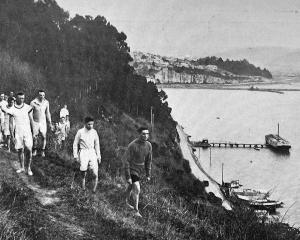The firm must have been put to considerable expense in installing the machinery, etc., most of which was manufactured by Messrs Stevenson and Cook, and is giving every satisfaction.
The hogsheads of ale are delivered from Messrs Speight and Co.'s brewery to the bottom floor of the Messrs Powley's bottling premises, and the ale is then pumped up to the second floor and run into three big cylindrical tanks, each of a holding capacity of about 1100 gallons.
Each cylinder has a small propeller installed in it, and the beer is worked up and put into condition, and then flows into four large tanks, situated in a chilling room in the bottom floor.
There the contents are chilled down to about 30deg., and undergo further treatment.
The ale is then led from the chilled room to the bottling department, where it is bottled and corked or crowned.
The bottled ale then undergoes its most important treatment.
The bottles are placed in a bath, and the water is then heated to a temperature of about 140deg., and then cooled down to 55deg.
The precaution is taken to put clamps over each cork or crown, so that the stoppers are not blown out under the heating process.
The heating has the effect of completely sterilising the ale, and though it may be kept for a lengthy period, it retains its condition and brightness, all organic growth having been killed by the heating.
The bottles are then labelled and are ready for sending out.
• Freezing operations at the Alexandra rabbit freezing works are proceeding steadily (says the Herald), consequently the chambers are well on the way to being full up.
The company expected to send the first consignment from the works this week.
• In the House of Commons Mr Asquith said that to-day's news from Ireland showed the situation still to present serious features.
The rebels still hold some important public buildings in Dublin, and fighting in the streets continues.
The troops have been and are being strongly reinforced.
The Government, after careful investigation, was satisfied that the forces despatched were adequate to deal with the situation.
The Cabinet had decided to-day that the Irish Executive must forthwith declare martial law over Ireland. - (Cheers.)
While martial law prevailed a military censorship was necessary, but he hoped to be able to allow some latitude in the transmission of news, subject to public and military requirements.
The Government's first and paramount duty was to restore order and stamp out rebellion with all possible promptitude.
That being done, an obligation undoubtedly rested on the Government to hold a searching investigation into the cause and responsibility for these events.
• A meeting of fishermen convened by the Rev. Jasper Smythe was held at Half Moon Bay on Saturday to discuss important questions in connection with the fishing industry, but more especially the disposal of groper. (states the Bluff Press).
There was a very large and representative number of fishermen present, including some from the adjoining bays.
It was unanimously resolved: "That a fishermen's union be formed in Stewart Island,'' and those present all agreed to become members.
By returns available it appears that 5700 groper were sent last year from Half Moon Bay, and if a fair price could be obtained the number this year might be very much greater. - ODT, 29.4.1916.
• COPIES OF PICTURE AVAILABLE FROM ODT FRONT OFFICE, LOWER STUART ST, OR WWW.OTAGOIMAGES.CO.NZ












